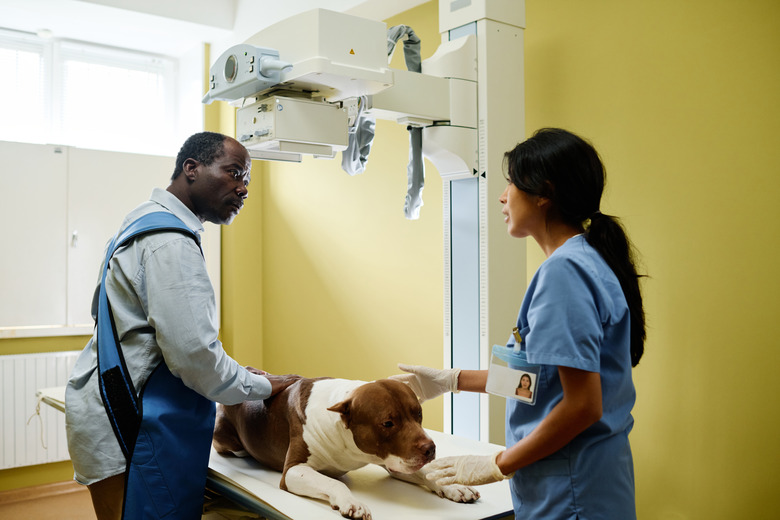Rimadyl Overdose In Dogs
Rimadyl is the brand name for the anti-inflammatory pain drug carprofen. It works quickly, and it is given to dogs to help relieve pain, particularly arthritis pain, and bring down a fever. It may also be given to help manage a dog's pain after they have orthopedic surgery or soft tissue surgery. This type of pain drug is a nonsteroidal anti-inflammatory drug (NSAID) in the same family as human medications ibuprofen and naproxen.
NSAID pain relievers can be lethal to dogs. Also, the chewable Rimadyl is so palatable that dogs have been known to chew through the plastic pill vial and eat multiple tablets at once, leading to an overdose and medical emergency. If your dog has an overdose, contact your veterinarian and bring them in for emergency treatment immediately.
Give your dog the correct dosage of Rimadyl
Give your dog the correct dosage of Rimadyl
Your veterinarian should give you all the information you need regarding how much Rimadyl is too much. The normal dosage of Rimadyl is 2 mg for every pound that the dog weighs every 24 hours or 1 mg per pound every 12 hours, according to Rimadyl's manufacturer, Zoetis. Giving more than the veterinarian's prescribed dose is not recommended and can be life-threatening. Always give this medication to your dog with food, preferably after a meal.
Symptoms of a Rimadyl overdose in dogs
Symptoms of a Rimadyl overdose in dogs
Symptoms of dogs suffering a Rimadyl overdose, which is also called a carprofen overdose, include black feces that resemble tar, disorientation, nausea (where a dog often licks their lips and cringes), vomiting, loss of appetite, increase in thirst, urinating more frequently, swelling of the abdomen, and tenderness of the abdomen. The dog will not want the abdomen or belly area touched and may not be able to lie down because of the pain.
Rimadyl overdoses can cause bleeding in the digestive tract, which causes the tarlike stools. Rimadyl can also damage the dog's kidneys, which results in the sudden increase in thirst, frequent urination, and very pale-colored urine. However, the most deadly is liver damage. Signs of liver damage include all of the signs for Rimadyl overdose plus a lack of energy and discoloration of the dog's skin inside the ears, the whites of the eyes, and the gums.
Treatment for Rimadyl overdose in dogs
Treatment for Rimadyl overdose in dogs
If your dog suffers a Rimadyl overdose, the veterinarian will likely induce vomiting if the dog hasn't started to regurgitate the excess medication on their own. In some cases, they may have their stomach pumped. They need activated charcoal to help absorb the toxin already in the stomach. Then, an antacid, such as famotidine, might be given.
To avoid dehydration and kidney damage, the dog will need to be fitted with a catheter and receive IV fluids. If the dog cannot stop vomiting, an anti-nausea medication can be given. Your dog will not have to be sedated or anesthetized to have an IV catheter placed. Also, while hospitalized, dogs may receive injectable famotidine which is not the antacid brand name Pepcid AC, although the over-the-counter oral form is known as Pepcid AC.
Side effects of Rimadyl in dogs
Side effects of Rimadyl in dogs
Even if your dog doesn't suffer an overdose of Rimadyl, there are potential side effects from giving your dog the correct dosage too. Ask your veterinarian about not only the benefits of the medicine but how your dog might be at risk for potential side effects. They'll be able to help you make the best informed decision for your unique pet's health even though not all side effects can be anticipated.
Some of the side effects of Rimadyl in dogs include vomiting, diarrhea, and loss of appetite. Lethargy and depression may also be side effects, so keep an eye out for any changes in your dog's moods or behaviors that might indicate depression. When a dog is depressed, they may become withdrawn, and eating and sleeping patterns might change subtly or drastically. If your dog suffers any significant side effects, talk to your veterinarian about safe alternatives to Rimadyl.
Considerations for certain breeds of dogs
Considerations for certain breeds of dogs
Golden retrievers, Labrador retrievers, or Labrador retriever crossbreeds are thought to be more prone to Rimadyl side effects and overdoses than any other dog breeds. Golden retrievers and Labrador retrievers on Rimadyl have died after taking the drug as prescribed. However, retrievers are more prone to arthritis than other breeds, so perhaps they are the breeds getting Rimadyl most often and therefore seem to suffer the most side effects.


